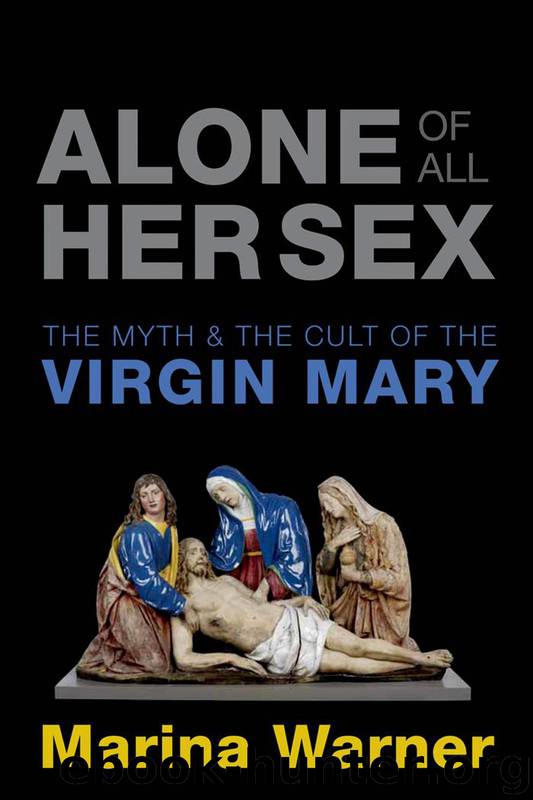Alone of All Her Sex: The Myth and the Cult of the Virgin Mary by Marina Warner

Author:Marina Warner [Warner, Marina]
Language: eng
Format: azw3
Publisher: Oxford University Press, USA
Published: 2013-03-21T04:00:00+00:00
FOURTEEN
Mater Dolorosa
Holy Mary, pierce me through
In my heart each wound renew
Of my saviour crucified.1
—POPULAR PRAYER
Five thousand years ago, in the dust-blown plain of Sumer or southern Mesopotamia, during the month of August, when nature’s anger was most pitiless and the scorched earth and relentless drought held the farmer captive, a chant went up as the priests invoked the life-giving powers of the new season and recited the annual liturgies of Dumuzi, the shepherd, and Inanna, the queen of heaven, his mother and his bride. Dumuzi had been sacrificed to the underworld, tortured and afflicted by demons, just as Christ suffered the tortures of his passion and then descended into hell. Inanna the goddess weeps for him:
Into his face she stares, seeing
what she has lost—his mother
who has lost him to death’s kingdom.
O the agony she bears,
shuddering in the wilderness,
she is the mother suffering so much.2
It could be a poem on a Christian icon of the Pietà: the dead Christ laid out on his grieving mother’s knees (plate 34).
In the religion of Sumer, Inanna was the “Lady of Heaven,” the presiding genius of the earth, and Dumuzi the guardian of flocks, the god of the sap and waters of spring, a shepherd “in love with the song of flutes.” His name means “true son,” and in some Sumerian laments he is called Damu, the child.3 In the liturgical poem Inanna’s Journey the goddess yields him up to the powers of the underworld as her surrogate:
And the seven devils gripped his thighs
like mortal sickness.
The flute-song of the shepherd
is broken, the pipes are shattered
in front of him,
for on him Inanna has fastened
the eyes of death . . .4
Dumuzi, pursued by monsters of drought and death and sterility, is abandoned to the merciless desert sun in the burning wasteland that is the Sumerian hell. He escapes, but they come at him again:
They flew at his face with hooks and bits
and bodkins, they slashed his body with a heavy-axe . . .
He escapes them again, but the devils seek him out, and after this, the Sumerian Way of the Cross, Dumuzi is taken down into death.5
Inanna, his spouse, then weeps for him, and his mother and sister Geshtinanna keen with her. His sister’s name means “Lady of Desolation,” and in the songs the singers are not distinguished, but a triad symbolizing woman in her relation to man under the one aspect of Lady of Sorrows. For Inanna is his wife, but he is also her “Child.” Inanna’s ritual grief is described:
My heart is piping in the wilderness
where the young man once went free.
He is a prisoner now in death’s kingdom,
lies bound where once he lived . . .
My heart is piping in the wilderness
an instrument of grief . . .
she is the mother desolate
in a desolate place; where once
he was alive, now he lies
like a young bull felled to the ground.6
Inanna weeps, though she herself delivered Dumuzi to his fate; in Christian belief the Virgin Mary mourns, though she consented to the Incarnation and the Atonement, and knows that Christ will rise again.
Download
This site does not store any files on its server. We only index and link to content provided by other sites. Please contact the content providers to delete copyright contents if any and email us, we'll remove relevant links or contents immediately.
We're Going to Need More Wine by Gabrielle Union(19035)
Pimp by Iceberg Slim(14489)
Bombshells: Glamour Girls of a Lifetime by Sullivan Steve(14058)
The Radium Girls by Kate Moore(12018)
Becoming by Michelle Obama(10021)
Educated by Tara Westover(8047)
The Girl Without a Voice by Casey Watson(7885)
Wiseguy by Nicholas Pileggi(5770)
The Wind in My Hair by Masih Alinejad(5092)
Hitman by Howie Carr(5089)
The Rules Do Not Apply by Ariel Levy(4957)
Hunger by Roxane Gay(4923)
On the Front Line with the Women Who Fight Back by Stacey Dooley(4870)
Year of Yes by Shonda Rhimes(4755)
The Borden Murders by Sarah Miller(4313)
Papillon (English) by Henri Charrière(4263)
Joan of Arc by Mary Gordon(4101)
American Kingpin by Nick Bilton(3876)
Patti Smith by Just Kids(3774)
